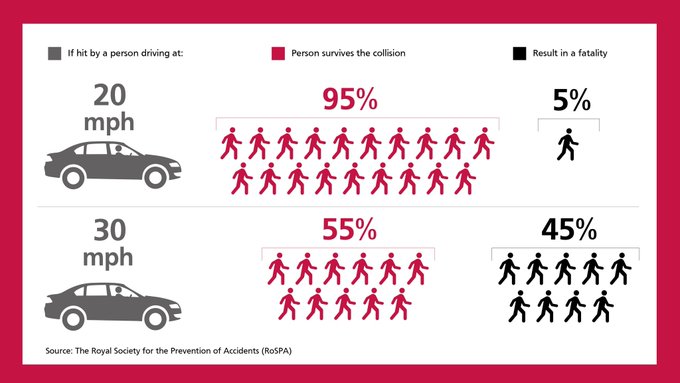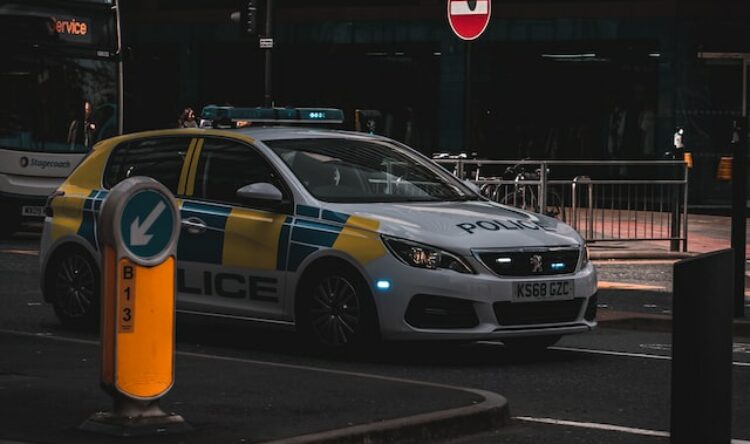Wales drives 20 through
The default urban speed limit in Wales is to be lowered to 20mph
Wales will introduce a default speed limit of 20 mph (30 km/h) in built-up areas from next year.
Legally enforcing the lower limit is a bid to lower road collisions and improve general road safety. But it is also hoped to cut air and noise pollution, as well as encouraging people to walk or cycle.
Speeding up the slow down
The reductions are currently being trialled in eight communities, but the change will be rolled out nationally in 2023. Currently, just 2.5% of Welsh roads have a speed limit of 20mph, but is now expected to increase to approximately 35%.
It follows a vote in the Welsh parliament which has backed the plan.I n the vote, 39 backed the legislation, while 15 opposed it.
The change will bring down the default urban speed limit down from 30 mph (50 km/h) on most busy streets and residential roads.
Wales is the first nation to make 20 mph the default speed limit on most roads. The new law is expected to come into force in September 2023.
Many towns and cities across the UK already have 20 mph limits in place, however, no country has yet imposed a default limit on all roads nationwide. Scotland is set to introduce similar driving laws in 2025.
The Welsh Government estimates that the initial change in signage would cost £33 million (€38.96 million) but that it could ultimately save £58 million (€68.49 million) in reduced emergency services and hospital admissions over the next 30 years.
Saving money and lives
The government and campaigners argue the move will save lives.
Police data from 2018 showed half of all injuries and 40% of deaths in road collisions in Wales happened on 30 mph roads or zones.
Eight pilot trials have already taken place across Wales, regarded as a success by Welsh ministers.
“We know that 20 mph zones reduce speed of traffic, reduce accidents – particularly accidents to children,” Wales’ First Minister, Mark Drakeford, told parliament.
“We want to see that become the default position right across Wales.”
Supporters of the proposal say that pedestrians are 40 per cent less likely to die when hit by a car travelling at 20 mph compared to one travelling at 30 mph – with stopping distances almost halved between both speeds.
“Travelling at 20 mph has been shown to reduce the risk of crashing and the severity of crashes that do still happen,” said Dr Sarah Jones, consultant in environmental public health at Public Health Wales.
“It also produces less noise pollution and reduces fuel consumption. It encourages people to walk and cycle, helping to fight obesity and improve mental well-being.
“All of these are likely to contribute to improvements in health and reduction in the demands for health services, which will help the NHS recovery from COVID”.
National support
The Royal Society for the Prevention of Accidents (Rospa) is a long campaigner for the lower limits. It encourages the wider use of 20mph limits as a “considerably less expensive” way than introducing traffic calming measures. Moreover, it “greatly improves the character of a residential area and quality of life for residents”.

Leading active travel and road safety organisations back the move. Rospa research claims pedestrians are 40% less likely to die when hit by a car travelling at 20mph compared with one travelling at 30mph.
Living Streets said there is “typically an average decline in casualties of at least 20%” with a 20mph speed limit compared to 30mph.
Sustrans Cymru said they want “communities built for safety rather than speed”.
Not everyone onboard
Both Labour and Plaid Cymru, who have a cooperation agreement and hold almost three-quarters of the 60 Senedd seats, backed the plan, but it has been met with criticism too.
A consultation conducted last year – which surveyed over 6,000 people on their opinions of the scheme – revealed 53% of people said they were against the lower default limit, as opposed to 47% who were in favour.
Reasons for opposing the scheme ranged from concerns it could “annoy” drivers to an increase in journey time and congestion.
The proposal has also sparked uproar among Welsh Conservatives. Sam Rowlands, a lawmaker for North Wales, has encouraged residents to voice their concerns about the plans.
“They are quite rightly very concerned as they believe that pollution is increasing because cars have to drive in a lower gear and wait longer at traffic lights, there have also been more accidents,” he said.
“I do support letting councils put 20 mph speed limits outside schools, hospitals and other areas where evidence shows it’s a benefit, but a blanket 20 mph speed limit across urban roads in Wales is just not right”.







